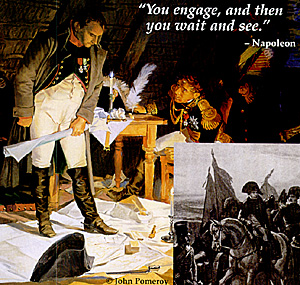
"No man has more indelibly stamped his personality on an era than did Napoleon. In his own time and for more than a century to come, military theory and practice were measured against his standards and related to his concepts of warmaking." (Ernest and Dupuy's The Encyclopedia of Military History.)
Although known as a gifted civil administrator, Napoleon built his fame and empire on the field of battle. His remarkable Italian campaign of 1796-1797 (pp. 36-37) established Napoleon as the master of a new style of warfare that stunned the old order of Europe. Inspired planning coupled with unflinching nerve were the hallmarks of his methods of war. Even his setbacks reflected glory upon him -- the expedition to Egypt in 1798 (pp. 39-41) was ultimately doomed by Britain's naval dominance (pp. 84-85). After he returned to France and took control of the government in 1799 (p. 42), he led his army across the Alps and descended on the Austrians to win the famous battle of Marengo, thereby preserving his political power (p. 43).
However, it was for his series of campaigns from 1805 to 1815 and for Waterloo that Napoleon is most remembered, during which he led his Grande Armee from Madrid to Moscow and fought some of the greatest battles in military history. Napoleon often fought against coalitions whose forces were larger than his own. Therefore, he typically sought to separate and defeat one enemy force in detail before turning upon the other. By the time the armies met for battle, Napoleon's preparations frequently ensured that he had the advantage. Napoleon was unique in that he was both an excellent director of operational maneuvers who frequently sought to turn an enemy's flank, and a highly skilled battlefield commander. Once he had defeated an enemy army, Napoleon usually attempted to complete its destruction through a relentless pursuit that gave it no time to rest and reorganize. To accomplish this, Napoleon used the excellent French cavalry force that he rebuilt, often led by his brother-in-law, the dashing Marshal Joachim Murat.
Despite commanding in nearly 70 battles, Napoleon was wounded only twice, at Toulon (1793) and Ratisbon (1809). He constantly made efforts to recognize and reward both officers and the common soldier. His charisma often swayed doubters and won enthusiastic loyalty. He led his men to many victories, earning France its greatest military glory.
Because plans rarely work out as expected, Napoleon's foresight and flexibility enabled him to adjust to changes and new situations more quickly than his opponents. The soldier-philosopher Karl von Clausewitz described war as "the province of chance," and Napoleon understood its risks and variables as few commanders ever did. As scholar Owen Connelly described it, Napoleon knew how to "scramble" to victory. David Chandler, perhaps the most well known author on the Napoleonic era, proclaimed "the world would never see a greater soldier."
More Napoleon: Introductory Guide
-
Introduction
Prejudice and Pride
Napoleon in Military School
The Young Artillerist's Double Life
Revolution & Opportunity
Women's Fashion During the Revolution
The Siege of Toulon
Napoleon & Josephine
Women's Fashion during the Directory
Fame & Glory: Italy
Fame & Glory: Egypt
Saviour or Usurper
Battle of Marengo
Civil Achievments
Enlightened Despot or Tyrant
Napoleon's Siblings
The Dawn of Gastronomy
Haydn and Beethoven
Women's Fashion during the Empire
Napoleon's Other Women
The Mashalate and Imperial Eagle
History's Greatest General?
Back to Table of Contents -- Napoleon #17
Back to Napoleon List of Issues
Back to MagWeb Master Magazine List
© Copyright 2001 by Napoleon LLC.
This article appears in MagWeb (Magazine Web) on the Internet World Wide Web.
The full text and graphics from other military history magazines and gaming magazines are available at http://www.magweb.com
Order Napoleon magazine direct